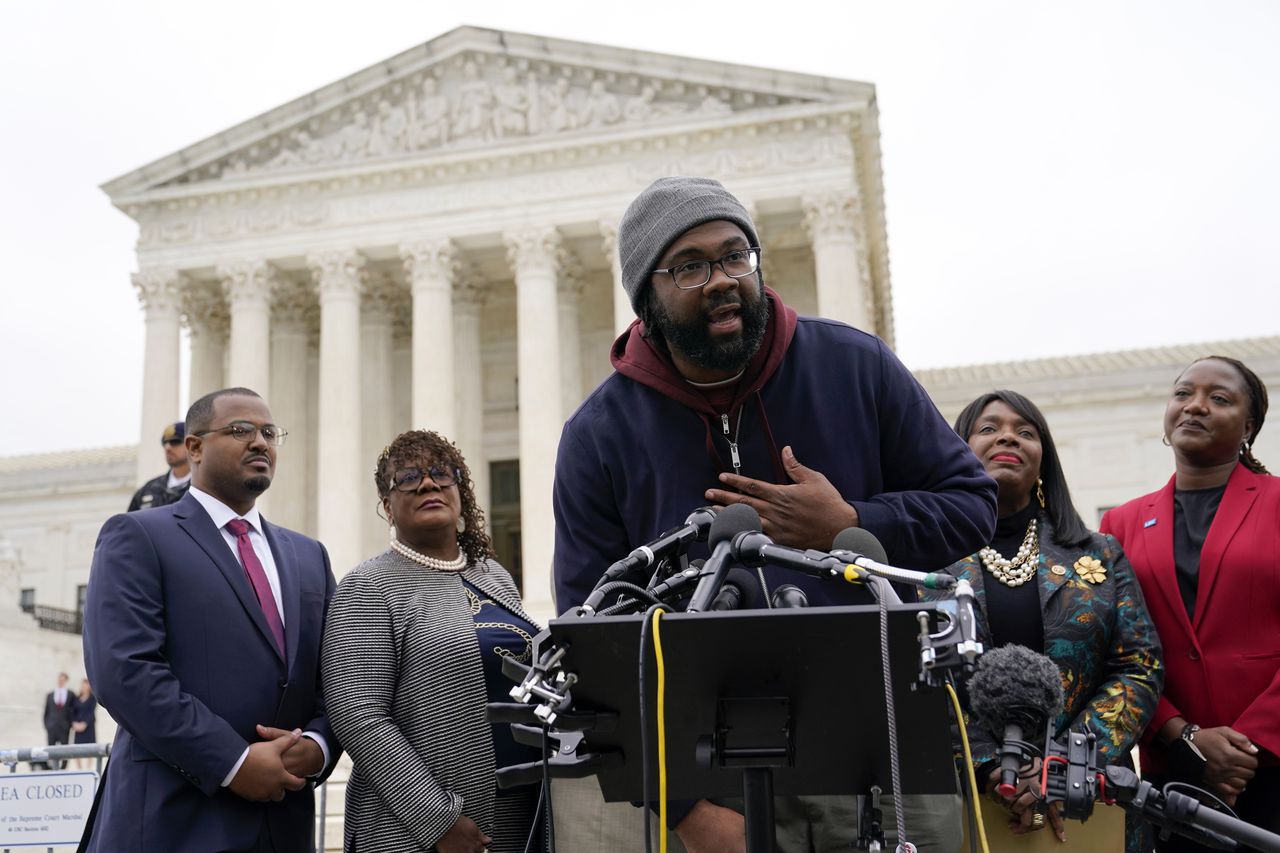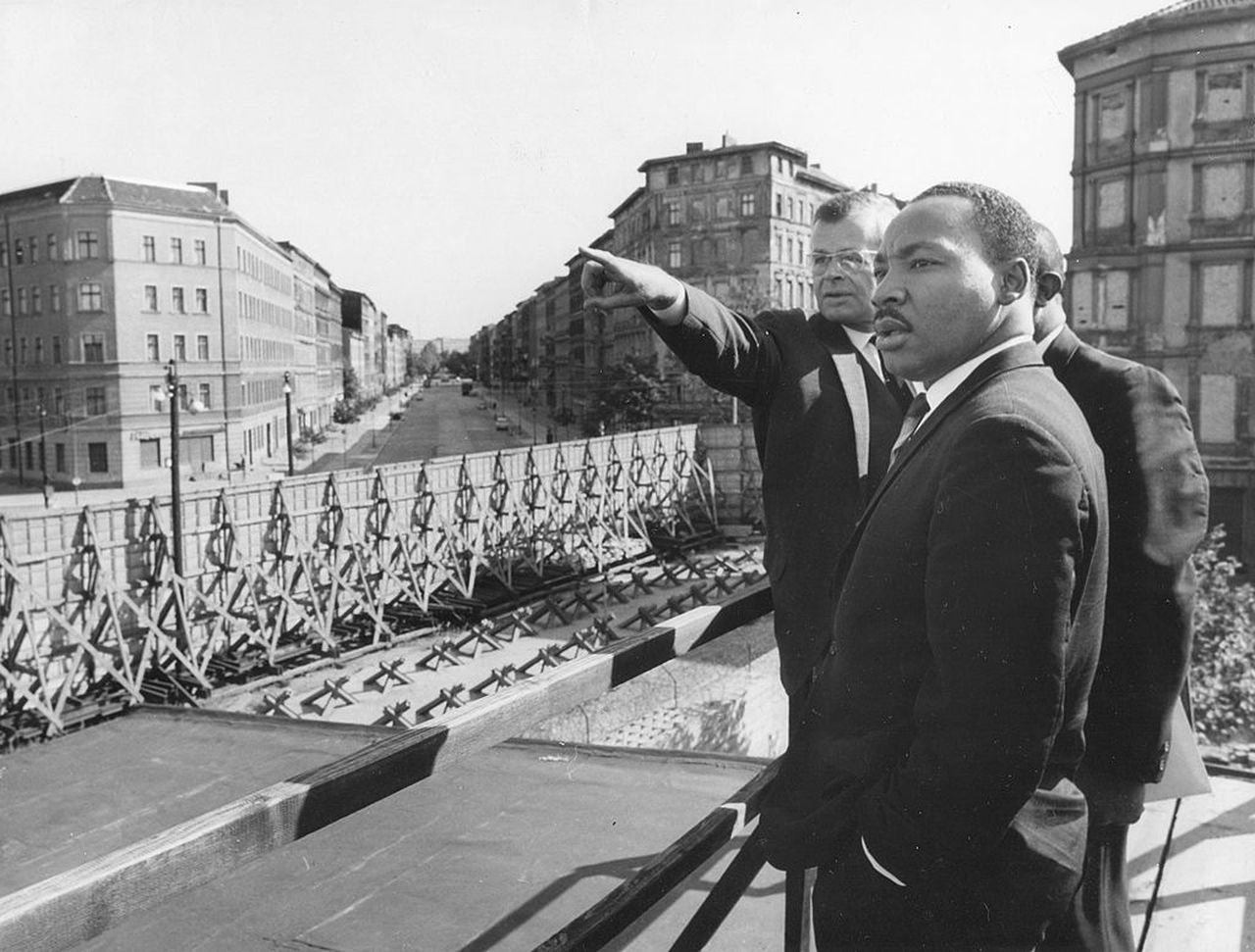Johnson: Plaintiff in historic SCOTUS case shed tears for late father after ruling
This is an opinion column.
Evan Milligan was in church when his phone began to buzz. In church in Berlin, among a group visiting and studying an area that was once home to one of the region’s largest Jewish communities. “It’s much, much smaller now,” Milligan says, “because of the Holocaust.”
They were inside Marienkirche (St. Mary’s Church). Dr. Martin Luther King famously preached there on September 13, 1964, after crossing Checkpoint Charlie at the Berlin Wall with only a credit card for identification.
King had been invited to Berlin by Willie Brandt, mayor of West Berlin, to commemorate a cultural festival. King described the city as “a symbol of the divisions of men on the face of the earth,” yet in the pulpit said: “We are all one in Christ Jesus, and that faith overcomes all man-made barriers.”
Dr Martin Luther King Jr at the Soviet Sector border of the Berlin Wall in Bernauer Strasse, Berlin, Germany, September 12, 1964. Werner Steltzer, director of the Berlin Information Center is indicating points of interest. (Photo by PhotoQuest/Getty Images)Getty Images
Milligan, 42, is executive director of Alabama Forward, the statewide civic engagement network at the center of the legal battle against the state’s gerrymandered congressional districts, which pooled Black voters largely into one district. African Americans comprise 27 percent of the state’s population, yet byzantine district lines left them represented by only 14 percent of Alabama’s seven members of the U.S. Congress.
He is the named plaintiff in the case—Allen (Secretary of State Wes Allen) v. Milligan—that rose to the U.S. Supreme Court, which stunningly ruled this week that Alabama had indeed diluted Black voting power in violation of the U.S. Constitution. The 5-4 decision, conservatives Chief Justice John G. Roberts and Justice Brett Kavanaugh joined the court’s three liberal justices, fortified provisions of the Voting Rights of 1965, which has long been under attack.
“Of all the places to receive this news,” Milligan shared with me Thursday from Berlin. “I broke down in tears thinking about my dad.”
For Evan, who was born in Houston and moved to Alabama as a young child, the now-historic case bears the name, too, of Bill Milligan, who died in 2021, just as his son was “getting in the groove” with redistricting coalition work.
“He was the one everyone called ‘Milligan’ in segregated Houston,” Evan said. “I had hoped for a victory in the case that bears his name and our family’s name. It connects his story, symbolically and emotionally, to the people doing the work and the people the case will empower.”

FILE – Evan Milligan, center, plaintiff in Merrill v. Milligan, an Alabama redistricting case that could have far-reaching effects on minority voting power across the United States, speaks with reporters following oral arguments at the Supreme Court in Washington, Oct. 4, 2022. Standing behind Milligan are Milligan’s counsel Deuel Ross, from left, Letetia Jackson, Rep. Terri Sewell, D-Ala., and Janai Nelson, President and Director-Counsel of the NAACP Legal Defense Fund. A U.S. Supreme Court decision a decade ago that tossed out the heart of the Voting Rights Act continues to reverberate across the country. Republican-led states continue to pass voting restrictions that, in several cases, would have been subject to federal review had the court left the provision intact. (AP Photo/Patrick Semansky, File)AP
Evan, for the first five years of his life, visited his maternal great-grandparents in Montgomery every summer. Once they grew older and needed care, Bill and Clair moved to Alabama, first to Birmingham then to Montgomery when their son was ready for first grade.
Even didn’t know the name of what he wanted to do when he grew up. Home was filled with Black history—art, artifacts, and books. Evan was a fantasy and sci-fi fan, and he devoured the Golden Legacy collection of Black history comics, illustrated biographies of iconic Black men and women, including Robert Smalls, Matthew Henson, Harriet Tubman, and Alexander Dumas.
“I didn’t know the word for it, I just longed to be part of their storyline,” he said. “I wanted to do work that helped my people on a larger scale. What was Malcolm X’s job? I didn’t know. As I got older I saw how my parents moved within the community and that I lived around people like [Malcom X]—not one person, but a network, that was about the people.”
After graduating from Birmingham Southern College and earning a degree and the New York School of Law, Milligan discovered the career path illustrated in the comic storylines of his youth: social justice. He joined the Equal Justice Initiative before taking the helm at Alabama Forward.
Allen v Milligan was not the first case in which he was involved to reach the nation’s highest court. He was at EJI in 2010 when the Supreme Court ruled in Sullivan (an EFI client) v. Florida and the accompanying case Graham v. Florida, making it unconstitutional to sentence juveniles to life in prison without parole for non-homicides. Two years later, EJI won a similar case in Miller v. Alabama, an accompanying case to Jackson v. Hobbs, when SCOTUS ruled it unconstitutional to sentence juveniles convicted of homicides to life without parole.
The rulings led to the freeing of many individuals across many states. “I personally witnessed 15 to 20 clients coming home because of those rulings,” Milligan said. “Overwhelmingly, the majority were Black men.”
Milligan was approached by the coalition to serve as a lead plaintiff in the redistricting case after Gov. Kay Ivey signed the bill in November 2021 that created new maps for congressional districts, the state House of Representatives, and the Board of Education.
He was reluctant. “I was most accustomed to playing in the background so I couldn’t see inserting myself into the storyline,” he said. He was persuaded to consider the role because his experience in numerous redistricting capacities would be invaluable.
“They wanted the named plaintiff to be someone they leaned on for testimony,” he said. “I’d been doing this work in some fashion for a long time—I’d worked in all 67 counties, prisons, many childcare centers, and so many nooks and crannies—combined with how I grew up, they told me those things were valued.
“I said, ‘Oh. Okay’”.
RELATED: Historic SCOTUS redistricting ruling proves a Black woman’s voice should never be misjudged
Bill Milligan finished college about the same time as his son; he was in his 60s. “He was autodidactic,” Evan said. “Taught himself through books, collected African American art, albums; he was a deejay and self-taught in photography. He was good at all these things but not someone who considered himself of influence when it came to elections and politics.
“He voted but considered himself as lower on the totem pole of the Black community.”
Not long after his phone buzzed as he sat in the church where King spoke of faith overcoming man-made barriers, Evan began to embrace the ‘barriers’ the coalition had overcome.
“That’s something I’m sensitive to,” he said. “I’ve been thinking about how democracy and freedom are not perfect, but they can, at minimum, help us question and confront the rigid caste systems and other things that determine life options.”
‘Milligan’ now stands among the names associated with the most vital Supreme Court cases in our history that confronted racism and preserved voting rights for Blacks and other minorities.
Stands as a name of influence.
More columns by Roy S. Johnson
Alabama’s SCOTUS lawyer gets critical race history lesson, courtesy Justice Ketanji Brown Jackson
Are we becoming the land of the bully and home of the nasty?
Through faith, former Birmingham news anchor finds unlikely new season as an actor
United Methodist member recalls effort in 1970s to merge Black and white congregations.
Instead of forcing kids to hear the ‘Star-Spanged Banner’, they should study it
Questioning parenting after youth violence is real, but does not absolve lawmaker inaction
I’m a Pulitzer Prize finalist for commentary and winner of the Edward R. Murrow prize for podcasts: “Unjustifiable,” co-hosted with John Archibald. My column appears in AL.com, as well as the Lede. Stay tuned for my upcoming limited series podcast “Panther: Blueprint for Black Power,” co-hosted with Eunice Elliott. Subscribe to my free weekly newsletter, The Barbershop, here. Reach me at [email protected], follow me at twitter.com/roysj, or on Instagram @roysj
